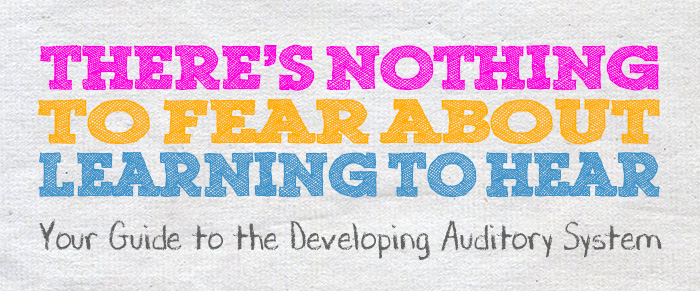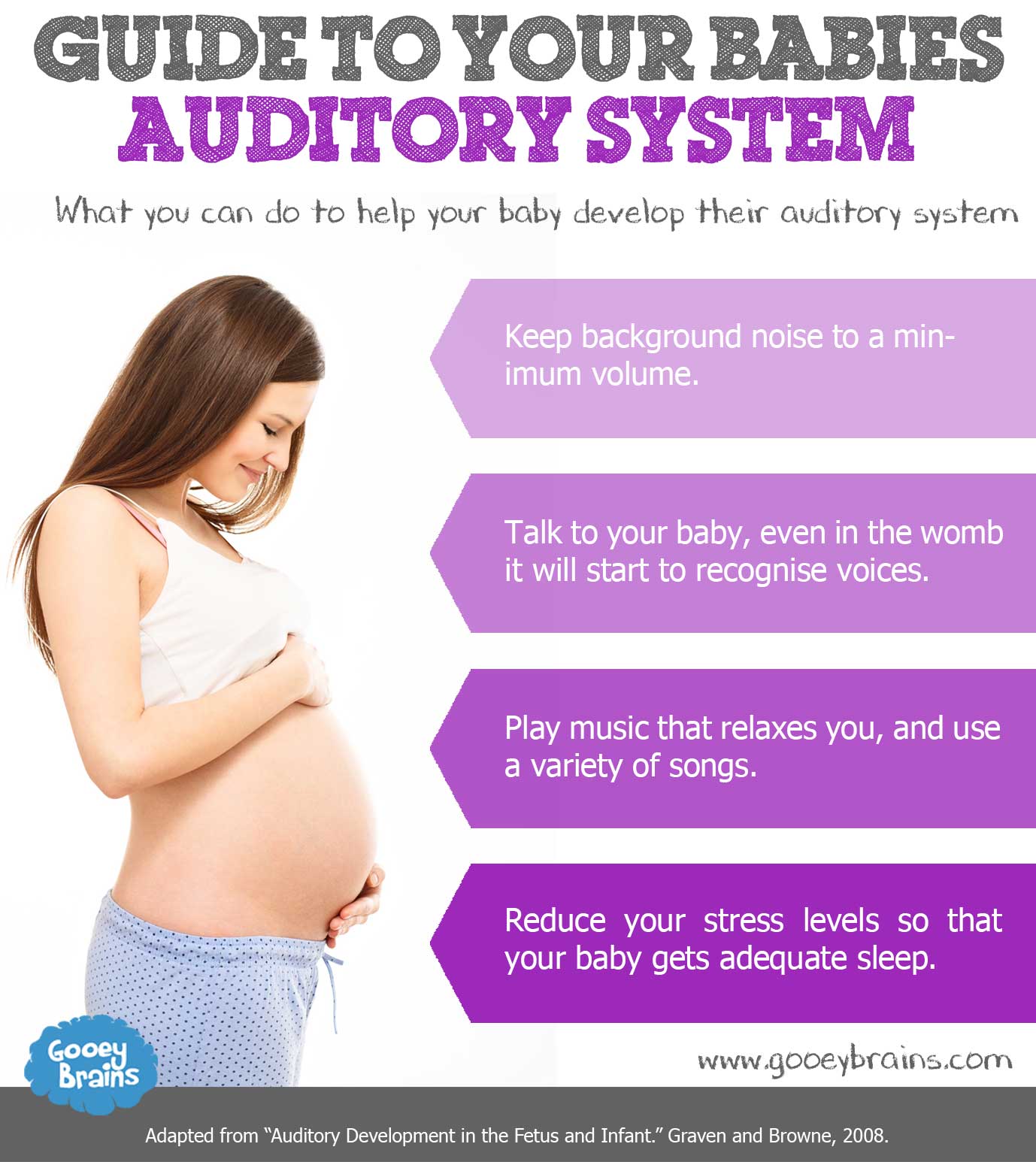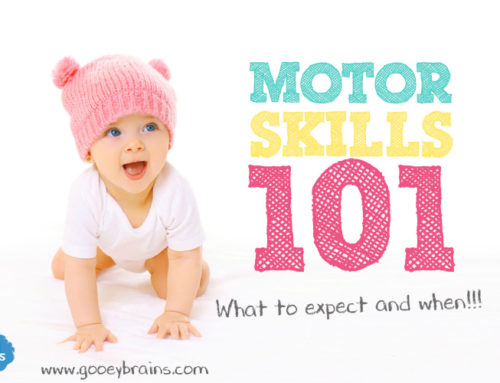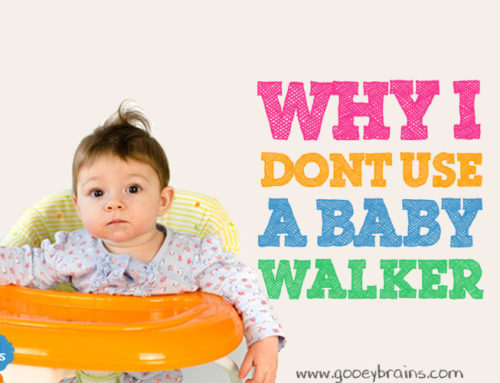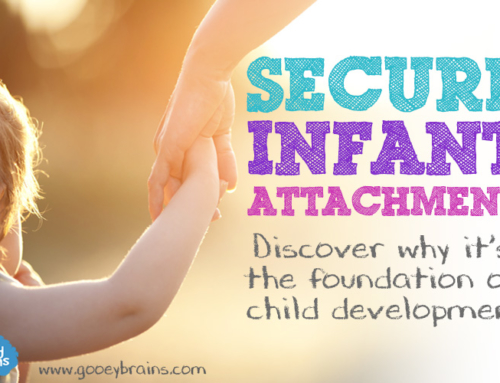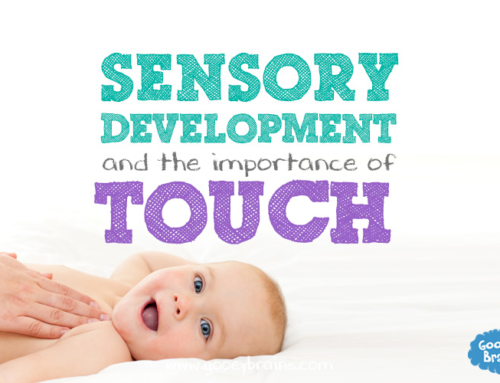Many expectant parents find themselves wondering when their baby will start hearing what is happening in the world around them. It is such an exciting time to think that the little baby still growing in your womb might be able to hear what you are saying and start to recognise the voice of mum and dad!
Let’s have a quick look at the basics of how your baby is developing its sense of hearing.
The Developing Auditory System
The system that controls your baby’s sense of hearing is called the auditory system! It develops throughout your pregnancy and then continues to develop and fine tune after your baby is born.
By about week 20 of pregnancy, your baby has developed the structure of its ears. Then, by about week 25 of pregnancy your baby has developed a part of its brain that allows it to understand and interpret the sounds that the ears are picking up.
There are two main areas involved in your baby learning to hear. The first is called the Cochlea and this is located inside the baby’s middle ear area. The second is called the Auditory Cortex and this is an area in the temporal lobe of the brain.
When these two areas are all set up and ready to go, the baby’s auditory system and ability to hear really starts to develop quickly. The auditory system is known to be particularly sensitive to growth and development between 25 weeks pregnant and 6 months of age.
Helping the Auditory System to Develop
In order for the auditory system to develop, your baby needs to be stimulated by meaningful sounds! These are usually sounds from its environment such as people talking, music and other important noises.
Noise volume can be a really important factor here. Your baby needs to be able to distinguish between meaningful sounds that they should pay attention to and meaningless background noise. In order for your baby to distinguish this, it is important that any background noise in the environment is less than sixty decibels. So what does 60 dB’s sound like? It is about the same as a conversation in a restaurant or office, typical background music, or an air conditioning unit from about 100 feet away.
Another really important factor to the development of the auditory system is that your baby is getting good cycles of REM sleep. While the auditory system is developing your baby needs to get enough REM sleep and have good REM sleep cycles. This is another key reason to minimise environmental noise and ensure the baby has a good relaxing environment to promote high quality sleep, even when he or she is still in the womb.
You can read more about the areas of the auditory system and its development in Graven and Browne’s article Auditory Development in the Fetus and Infant published in 2008.
What Can Your Unborn Baby Hear?
To begin with, the baby can only hear low noises (not high pitched sounds). Robert Adams from the University of Florida explains that men’s voices are more clear than women’s voices to a fetus. But interestingly, babies still prefer the sound of their mother’s voice possibly due to the familiarity of hearing it more often. Much of the research has demonstrated that babies like familiar sounds. Babies have been shown to recognise the voice of their mum, or even a repeated story that they heard in the womb.
As your pregnancy progresses, the baby will start to be able to discriminate between different voices, languages and sounds. Babies learn speech sounds while in the womb, and when they are born their cries actually imitate the accents they have been exposed to and they cry with this accent.
Babies can also hear loud noises. Unborn babies get startled and move around when they hear a loud sound, their heart beat even speeds up in response to this alarm.
Should I Play Music to My Unborn Baby?
A newborn has been shown to recognise music that is heard while it was in the womb. However, it is unclear as to whether this has any advantages to the baby’s later development.
While it is true that babies in the womb can hear in the third trimester, and that they can also learn in the womb, there is actually no solid scientific evidence that playing music (rather than just exposure to everyday sounds) provides your baby with long term benefits.
Although it is unclear whether hearing music in the womb has any special advantages, it is still a source of meaningful auditory stimulation that can help the baby’s auditory system to develop. Some babies have been shown to start breathing in time to the music that they are hearing! Just remember to change the song from time to time, as the baby will start to tune out the music if it is repetitive.
One way that music can benefit your unborn baby is if it relaxes the mother. A relaxed mum usually means a relaxed baby! When the mother and baby are relaxed then the baby can get the sleep it needs to help the auditory system to develop. It doesn’t particularly matter what genre of music is chosen, as long as it works to assist in stress reduction for the mother. Setting aside some time to play music to your baby can also show positive results as it promotes mum, dad, baby and/or other important caregivers spending quality time with the unborn baby which is known to build and strengthen parenting relationships and caregiver-infant attachment prior to the birth.
Can Playing Music To My Unborn Baby Be Harmful?
Yes! If the music you are playing is too loud, or the speakers are positioned too close to the baby then you may overstimulate your baby’s ears and brain. Too much noise actually interferes with the development of the auditory system. Loud music may also disrupt the baby’s sleep cycle further impacting the development of this system.
What Can You Do?
This is a tricky one! Here are some things that parents find useful, although the scientists have not compiled enough evidence yet to fully support them…
- Some think that babies that are spoken to while in the womb develop earlier speech skills. This is controversial as there are so many other factors after birth that may contribute to these skills as well! At the very least, it will help your baby to learn to recognise the voice of mum and dad.
- Talking with your baby and using its name helps parents to build a bond and attachment to the baby before it is born and this strengthens their relationship with the newborn. Some parents think that their newborns then recognise their name at birth, but the jury is still out on this one.
You can read more about this in Science Magazine, and Psychology Today Magazine.

